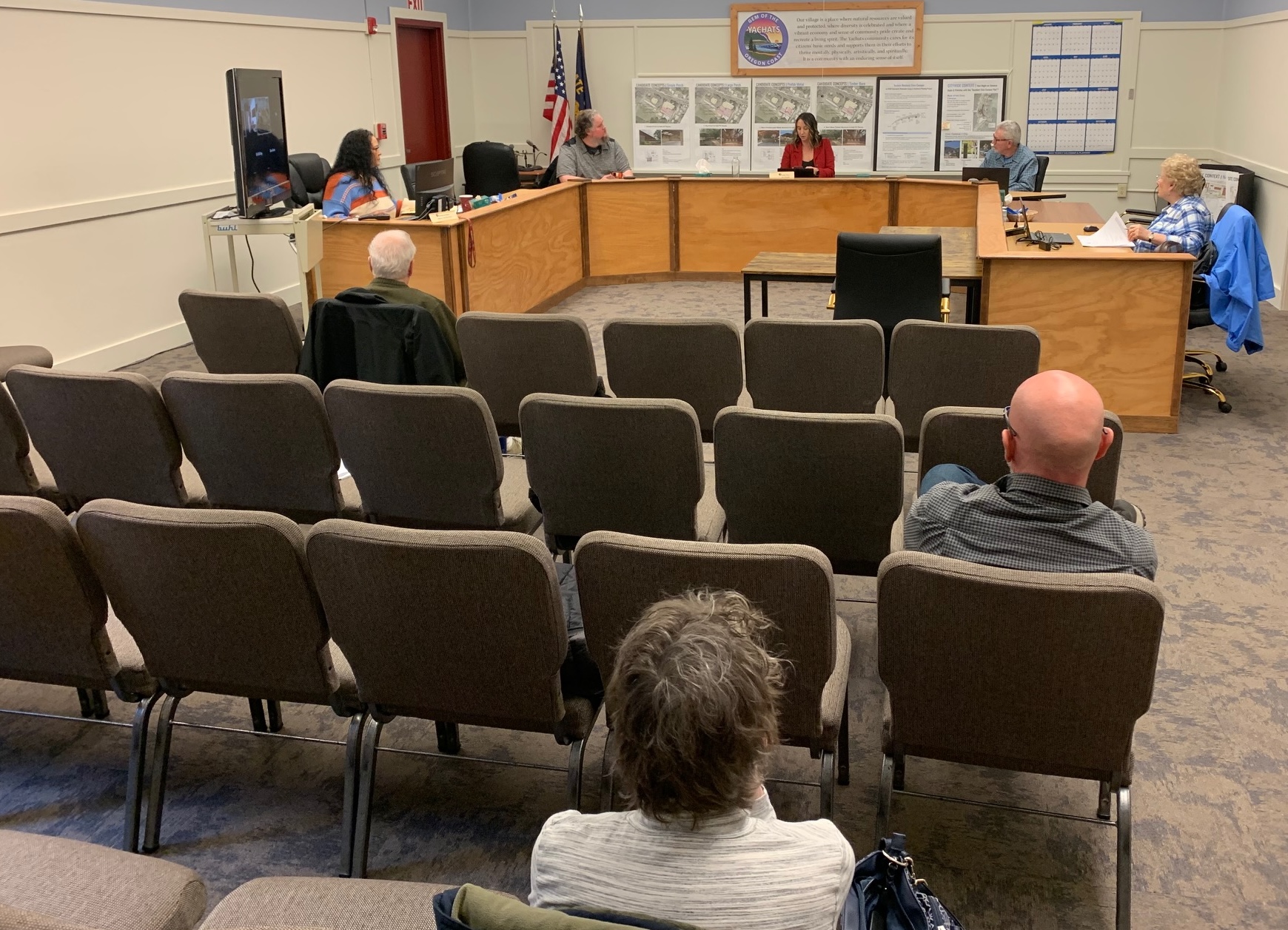
By GARRET JAROS/YachatsNews
YACHATS – Finding the pot of gold the city of Yachats has paid to improve its computer system is no problem – its finance committee has it detailed in black and white.
What is proving elusive, however, is finding the rainbow of service orders that needed but never received approval as well as an accounting of what has been done and when it will all be finished.
At the urging of councilor Greg Scott, the city of Yachats in 2021 contracted with Oregon State University’s Center for Applied Systems and Software to fix some bugs on the city’s website and to provide additional software to bring the site up to speed in several areas.
The three-person finance committee along with city manager Bobbi Price had hoped to lasso the prism of missing information they requested but never received when they invited CASS’s project managers to attend the committee’s Tuesday meeting.
But that is not what happened.
CASS director Carrie Hertel and senior software engineer Mark Clements, who is leading the development of Yachats’ software, attended the meeting via Zoom instead of in person as requested. A miscommunication had them prepared to answer questions but not give the expected presentation or provide documentation of service orders.
In a letter Price sent to Hertel well in advance of the meeting, she outlined the details the city has on the two signed consulting contracts. The first is to provide a completed vision and scope of the work to be done – and not to exceed $4,000. The second contract was to implement “code changes” identified in the first contract and not to exceed $25,000. If there were services needed after the second contract, the city would write a service order to CASS – which would then estimate a cost and return it to the city manager for approval.
In her letter, Price said the city reviewed its records, found copies of the contracts, but no record of the vision and scope required by the first contract, or any of the “deliverables” of service orders executed in the second contract.
Billing for both have “far exceeded” both contracts’ maximums, Price wrote. The city paid $12,377 for the first contract and $70,349 for the second, which expired June 30. The city also paid an additional $50,662, bringing the total payments to $133,388.
“We expect this project status report and contract review can fill in the holes in our documentation and administration of this project,” Price wrote. “Thank you in advance for working with the city … to meet and gain a better understanding of the issues surrounding this project.”
Hertel responded to the letter by sending additional information showing that both contracts had been amended. The first contract was increased to $26,000 and the second was “not to exceed” $125,000 with an end date of June 2024.

Where are service orders?
During Tuesday’s meeting Clements provided a basic rundown of the work in progress and the challenges of seamlessly merging the new software with the city’s current software. But the question of signed service orders remained.
Finance committee member Tom Lauritzen addressed the public directly to say “the contracts clearly state that no work will be performed until those service orders are estimated by OSU” and signed off by the city manager, which is what led to the committee’s request that OSU provide the orders. The service orders were a requirement placed in the contracts by CASS.
“How did you get around that clause Carrie?” Lauritzen asked. “In the contract that says you need to have the city manager sign off on the service orders.”
“We did have initial service orders,” Hertel said. “I think with the churn of the city managers changing a few times and being interim, (city councilor) Greg (Scott) was our, what we call a product owner.”
OSU was working on things Scott asked them to do and met with him twice a week to make sure the scope of the work was useful for the city, she added.
“There was a lot of change and a lot of uncertainty that was going on and we were following what we thought we were told to work on,” she said.
Price interjected to say there are a few months left in the current contract and a chunk of money still to be spent. The city originally authorized $159,000 for the project. The cost to date is $133,395.
Given that time and money, Price asked if CASS could direct its attention to getting the Go Yachats website the city uses for collecting license fees and vacation rental and food and beverage taxes completed, and fix the current glitches that users experience?

Scott, who attended the meeting, said the problem is there are a lot of interconnected pieces that all fit together and in order to solve the problem CASS needed to work on all of them.
“And so a lot of what we have been doing in the interim was essentially setting the ground, building the foundation that needed to be in place in order to get licenses and taxes and the accounting pieces done,” he said. “So that has been the focus.”
The work has not deviated from that goal save for completing the reservation system for the Commons, which was mostly completed months ago.
“But it’s also tied to email, so it’s a key piece,” he said. “Solving the email problem has been very high on the priority of work.”
The question of compatibility between the work being done by OSU and the city’s Civic Plus software then came into question with Price asking – “we’ve spent money on these different applications so how can we use them without getting rid of Civic Plus?”
After some discussion, CASS staff said the two can be integrated in some fashion.
Committee member Viki West then asked if there is an end in sight and whether the city has gotten value for the money spent?
“That’s the big question,” Price said.
Scott used the analogy of renting versus owning and equated having a CASS-designed system to having ownership of a city asset compared to renting with the annual fee it pays Civic Plus. The discussion also touched on which software best served the public and city staff.
Former interim city manager Rick Sant suggested the OSU team meet with city staff to discuss what the city wants before completing the second contract. It was decided the CASS team will meet with Price to discuss the contract and outline what needs to be done, what it will cost and when it will be finished.
But after the committee moved on to discuss other business and the CASS staff and Scott left, the subject came up again.

Lauritzen said the turnover of city staff should not have affected service orders getting done and suggested OSU be asked to finish the work underway without charging the city any additional fees.
“Ideally, our city has backbone,” Lauritzen said. “I know this committee does. I think we would be in perfect position to ask them to do it gratis because of all of the discomfort they’ve created, and all of the angst they have caused as an agreement not to sue you for not following your own contract, finish this module, call it good.”
Sant shared the sentiment.
“The city’s already paid for it, we just never received it,” he said. “Finish the job. No more money. Finish the job … Not only that, but since when do you buy a software package that doesn’t exist yet? This goes on and on and on and on – it’s never ending.”
“And it will never end,” added committee member Charles Bame-Aldred.
“No,” Sant said. “For the amount of money we spent on that we could have bought four systems.”
A discussion around Scott alluding to replacing Civic Plus with a CASS-designed database to save money was also dismissed with all agreeing that Civic Plus is affordable and ubiquitous as many other municipalities and counties, including Lincoln County, use the system.
- Garret Jaros is YachatsNews’ full-time reporter and can be reached atGJaros@YachatsNews.com


